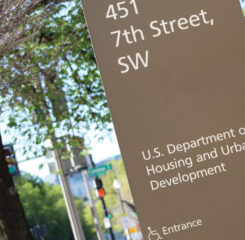HUD posts FY2021 Income Limits
Effective April 1, HUD issued FY2021 income limits to determine eligibility for assisted housing programs including the Public Housing, Section 8 project-based, Section 8 Housing Choice Voucher, Section 202 housing for the elderly, and Section 811 housing for persons with disabilities programs.
HUD develops annual income limits based on Median Family Income estimates and Fair Market Rent area definitions. The national median family income for the United States for FY 2021 is $79,900, an increase over the national median family income in FY 2020 of $78,500. Income limits are also adjusted according to family size and in areas with unusually high or low incomes relative to housing costs.
The most important statutory provisions relating to income limits are as follows:
- “very low-income family” is defined as low-income families whose incomes do not exceed 50 percent of the median family income for the area;
- “low-income family” is defined as those families whose incomes do not exceed 80 percent of the median family income for the area; and
- “extremely low-income family” is defined as a very-low income family whose income does not exceed the higher of the poverty guidelines or 30 percent of the median family income for the area.
The FY21 income limits are also used in programs run by agencies such as the Department of the Treasury, the Department of Agriculture (rural housing), and the Federal Housing Finance Agency (FHFA). Community planning and development programs, as well as HOME investments, also rely on HUD income limits in their administration.
HUD also posted the Multifamily Tax Subsidy Projects (MTSP) Income Limits for FY2021, effective April 1. The MTSP income Limits are used to determine qualification levels, as well as set maximum rents, for projects funded with tax credits or financed with tax exempt housing bonds.
New this year, HUD’s MTSP data set includes the following disclaimer: “NOTE: The Low-Income Housing Tax Credit (LIHTC) program is administered by the Internal Revenue Service (IRS). Pursuant to an IRS revenue ruling, participating properties base their rents on the income limits that HUD is mandated to publish. However, HUD has no control over how LIHTC rents are set and has not required or suggested rent increases. HUD continues to encourage property owners to exercise compassion with respect to tenants affected by the COVID-19 pandemic and would be surprised that an owner would be so out of step with the moment in which we are living to raise rents at this time.”

Most Recommended
October 15, 2025
 Shutdown Week Three: Impact of Ongoing Closure on Affordable Housing
Shutdown Week Three: Impact of Ongoing Closure on Affordable Housing
February 03, 2026
Fiscal Year (FY) Funding 2026
October 07, 2025
Immigrant Workforce Matching Program Brings Workforce Relief
Recently Added
February 10, 2026
 HUD Streamlines Section 202 PRAC Budget Approvals
HUD Streamlines Section 202 PRAC Budget Approvals
February 10, 2026
Seeking Clarity in the Chaos
February 09, 2026



